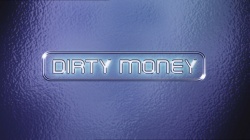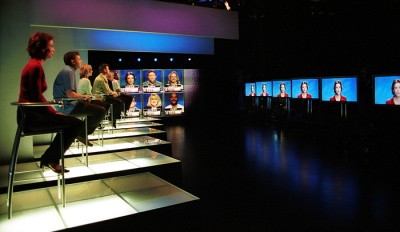Dirty Money
(=Synopsis= repeats on Sky Three confirm the rules.) |
|||
| (15 intermediate revisions not shown) | |||
| Line 1: | Line 1: | ||
| + | [[Image:Dirtymoney logo.jpg|250px]] | ||
| + | |||
<div class="box"> | <div class="box"> | ||
| + | |||
== Host == | == Host == | ||
| - | [[Marcus Bentley]] | + | [[Marcus Bentley]] |
== Broadcast == | == Broadcast == | ||
| - | 12 Yard for Sky | + | 12 Yard for Sky One, 15 April to 24 May 2002 (30 episodes in 1 series) |
</div> | </div> | ||
| + | |||
== Synopsis == | == Synopsis == | ||
Marcus Bentley gives £500 to six people and challenges them to keep hold of it. Each round consists of 90 seconds of general knowledge questions on the buzzer. Get a question correct and you can nick £50 from any player. Get it wrong and you have to give £50 to any player. At the end of each round, the person with the lowest amount of cash is eliminated. But they don't get to keep the cash - oh no! Instead they have to give their "dirty money" to the player of their choosing. As you can well imagine this is of more importance as the eliminations progress. | Marcus Bentley gives £500 to six people and challenges them to keep hold of it. Each round consists of 90 seconds of general knowledge questions on the buzzer. Get a question correct and you can nick £50 from any player. Get it wrong and you have to give £50 to any player. At the end of each round, the person with the lowest amount of cash is eliminated. But they don't get to keep the cash - oh no! Instead they have to give their "dirty money" to the player of their choosing. As you can well imagine this is of more importance as the eliminations progress. | ||
| - | The rules change slightly after the fourth contestant is eliminated. They can split their money between the remaining two players however they want, instead of being forced to give it all to one player and almost certainly creating a very uneven final round (though they can of course still do this if they wish). Also, each answer in the final | + | The rules change slightly after the fourth contestant is eliminated. They can split their money between the remaining two players however they want, instead of being forced to give it all to one player and almost certainly creating a very uneven final round (though they can of course still do this if they wish). Also, each answer in the final round was worth £100. Whoever had the most money in the final round gets to play for all £3,000 in the exciting and highly original answer-six-questions-in-sixty-seconds end game (although with 75 seconds instead, presumably as Marcus' reading style is hardly what you would characterize as 'quick-fire'). If they win they keep all the cash. If they lose however, they've got to give all the cash to the player of their choosing. So it's worth thinking about who you give your money to if you get eliminated. |
| + | |||
| + | <div class="image">[[Image:Dirty_money_studio.jpg|400px]] | ||
| + | |||
| + | ''Contestants facing the shop window of Dixons''</div> | ||
Not much in the way of music or set really. The players are sitting on stools in front of a blue screen with a videowall off to the left, which the camera pans and then zooms into for the opening of each round. With a round in progress viewers see each contestant in a window with the amount of cash on an electronic counter thing. The clock is all trendy (i.e. it updates every ten seconds). | Not much in the way of music or set really. The players are sitting on stools in front of a blue screen with a videowall off to the left, which the camera pans and then zooms into for the opening of each round. With a round in progress viewers see each contestant in a window with the amount of cash on an electronic counter thing. The clock is all trendy (i.e. it updates every ten seconds). | ||
| Line 19: | Line 27: | ||
Marcus Bentley hosts in robotic voiceover form. Robotic because there was no variation of phrases used to control the game. Also, for some reason, rather than just let the player announce who they're going to give their money to when they lose, Bentley asks "are you going to give it to..." for each player until it's given away. Baffling. | Marcus Bentley hosts in robotic voiceover form. Robotic because there was no variation of phrases used to control the game. Also, for some reason, rather than just let the player announce who they're going to give their money to when they lose, Bentley asks "are you going to give it to..." for each player until it's given away. Baffling. | ||
| - | Chalk another one up for the David Young No-one Can Get Too Confident Factory. | + | Chalk another one up for the [[David Young]] No-one Can Get Too Confident Factory. |
== Catchphrases == | == Catchphrases == | ||
| - | "...and the clock... is ticking." | + | "It's time to play... Dirty Money... and the clock... is ticking." |
| + | |||
| + | "Your account is empty. For you, it's game over." | ||
| + | |||
| + | == Inventor == | ||
| + | |||
| + | Andy Culpin and Gail Sloan | ||
| + | |||
| + | == Theme music == | ||
| + | |||
| + | Will Slater and Richard Clark | ||
[[Category:General Knowledge Quiz]] | [[Category:General Knowledge Quiz]] | ||
| + | [[Category:Host Out Of Vision]] | ||
| + | [[Category:12 Yard Productions]] | ||
Current revision as of 03:19, 8 October 2024
Synopsis
Marcus Bentley gives £500 to six people and challenges them to keep hold of it. Each round consists of 90 seconds of general knowledge questions on the buzzer. Get a question correct and you can nick £50 from any player. Get it wrong and you have to give £50 to any player. At the end of each round, the person with the lowest amount of cash is eliminated. But they don't get to keep the cash - oh no! Instead they have to give their "dirty money" to the player of their choosing. As you can well imagine this is of more importance as the eliminations progress.
The rules change slightly after the fourth contestant is eliminated. They can split their money between the remaining two players however they want, instead of being forced to give it all to one player and almost certainly creating a very uneven final round (though they can of course still do this if they wish). Also, each answer in the final round was worth £100. Whoever had the most money in the final round gets to play for all £3,000 in the exciting and highly original answer-six-questions-in-sixty-seconds end game (although with 75 seconds instead, presumably as Marcus' reading style is hardly what you would characterize as 'quick-fire'). If they win they keep all the cash. If they lose however, they've got to give all the cash to the player of their choosing. So it's worth thinking about who you give your money to if you get eliminated.
Not much in the way of music or set really. The players are sitting on stools in front of a blue screen with a videowall off to the left, which the camera pans and then zooms into for the opening of each round. With a round in progress viewers see each contestant in a window with the amount of cash on an electronic counter thing. The clock is all trendy (i.e. it updates every ten seconds).
Marcus Bentley hosts in robotic voiceover form. Robotic because there was no variation of phrases used to control the game. Also, for some reason, rather than just let the player announce who they're going to give their money to when they lose, Bentley asks "are you going to give it to..." for each player until it's given away. Baffling.
Chalk another one up for the David Young No-one Can Get Too Confident Factory.
Catchphrases
"It's time to play... Dirty Money... and the clock... is ticking."
"Your account is empty. For you, it's game over."
Inventor
Andy Culpin and Gail Sloan
Theme music
Will Slater and Richard Clark



